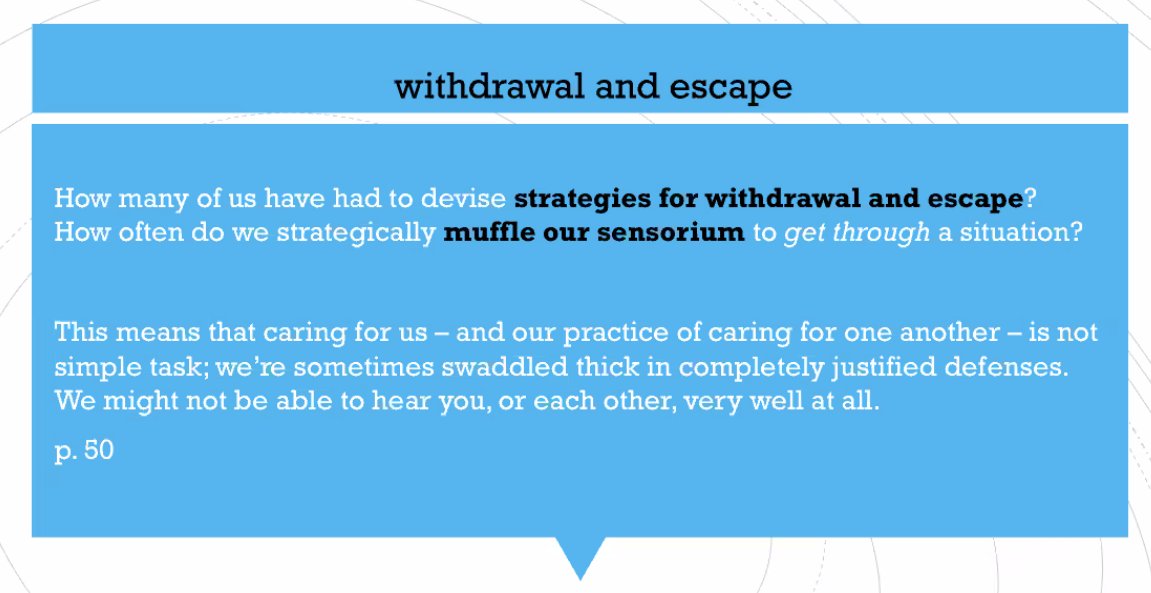
So excited to be at this event! (Happening NOW!)
https://twitter.com/HilMalatino/status/1328727091370729473
@HilMalatino starts off in the chat with "Hi all! In the spirit of Trans Care, I’ve posted this link to Trans Lifeline’s “Until We’re All Free” campaign. They’re raising funds for bail and for commissary, and I encourage y’all to donate." secure.givelively.org/donate/trans-l…
(before a few obligatory words about the newest Elliot in a long line of Elliots and the shared joy that evoked among panelists and by audience members [in the chat] alike)
@HilMalatino then moves to talk about the level of emotional labor and fatigue writing Trans Care entailed and the personal experiences against which that work reverberates.
"It's 72 pages. It's a little baby book. And it's also open access, so it's available online for anyone to read at any point" - @HilMalatino on #TransCare manifold.umn.edu/projects/trans…
How to develop a politics of citation that was also a politics of care? @HilMalatino discusses the desire to turn towards trans scholars and the implications of working to realize such a citational politics. [(definitely)👆🏻thread👇🏻(probably)]
This conversation speaks so deeply to struggles I often feel in my own work: I hear my own challenges with finding, articulating, & living up to my own citational ethics & politics. Hil (seemingly) so easily lays words on ideas that I have struggled to find for myself. [7/?]
Alongside and within what I am hearing in this conversation, I am thinking about the following (a question I revisit so very frequently): How do we build, support, [insert numerous verbs] webs of care among thinkers who are creating queer and trans knowledges? [8/]
(A question that has many contextually-dependent answers.... A question that I am sure this book will speak to, directly and indirectly, and reshape through its own lens... A question I am sure I will continue to revisit indefinitely...) [9/]
Jules Gill-Peterson is reading some prepared thoughts about the politics of hate that inflects the lives of trans people today and how @HilMalatino's work is unique in the way that it meets these critically important moments of collective trans witnessing. [10/]
Jules Gill-Peterson calls it "our trans little yellow book." My tweets fail to fully capture the richness of these remarks, of the thinking, of the dialogue that is happening here and now. I am grateful to be able to share in this moment, in this thinking, in this dialogue. [11/]
Ann Cvetkovich continues to discuss just how meaningful it is for us as scholars to see our work be of use to fellow scholars, to "fellow travelers" [circling back up to tweets 7-9 in this thread]. [12/]
@HilMalatino continues to talk about a commitment to theorizing the mundane, which stems from the really boring day-to-day work that we do to show up for one another & that work looks like in the current every day. Showing up in these contexts can become very difficult [13/]
"Trans doesn't function as an identarian category in this book [...] what makes people trans in this book is how we care for one another [...is] shared experiences [...] which is such a gift for trans studies" - @gp_jls discussing #TransCare by @HilMalatino [14/]
@HilMalatino responds by thanking @gp_jls for this👆🏻reflection, discussing ontological Qs & the incoherence that they can reveal in the ways that we think & talk about what it means to be trans. Ultimately, Hil comes to underscore the importance of committing to the above. [15/]
As the panelists move to talk about withdrawal and escape, this feels like a perfect moment on which to close out this live thread, so as to give myself space to digest & to just be in this moment as well as space to reflect on trauma, care, (dis)trust, & collectivities. [16/] 

Thank you to @HilMalatino @gp_jls Ann Cvetkovich and Erin Heidt-Forsythe for this deeply meaningful dialogue today. 🙏🏻 [17/17]
It's poetic to have you like this tweet, @CynthiaDNelson !
https://twitter.com/krisknisely/status/1333890097209507840?s=19
• • •
Missing some Tweet in this thread? You can try to
force a refresh






